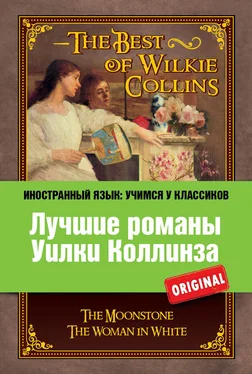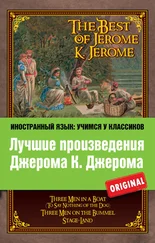I couldn’t bring myself to look at the Sergeant – I looked at Mr. Franklin, who stood nearest to me. He seemed to be even more sorely distressed at what had passed than I was.
“I told you I was uneasy about her,” he said. “And now you see why.”
“Miss Verinder appears to be a little out of temper about the loss of her Diamond,” remarked the Sergeant. “It’s a valuable jewel. Natural enough! natural enough!”
Here was the excuse that I had made for her (when she forgot herself before Superintendent Seegrave, on the previous day) being made for her over again, by a man who couldn’t have had MY interest in making it – for he was a perfect stranger! A kind of cold shudder ran through me, which I couldn’t account for at the time. I know, now, that I must have got my first suspicion, at that moment, of a new light (and horrid light) having suddenly fallen on the case, in the mind of Sergeant Cuff – purely and entirely in consequence of what he had seen in Miss Rachel, and heard from Miss Rachel, at that first interview between them.
“A young lady’s tongue is a privileged member, sir,” says the Sergeant to Mr. Franklin. “Let us forget what has passed, and go straight on with this business. Thanks to you, we know when the paint was dry. The next thing to discover is when the paint was last seen without that smear. YOU have got a head on your shoulders – and you understand what I mean.”
Mr. Franklin composed himself, and came back with an effort from Miss Rachel to the matter in hand.
“I think I do understand,” he said. “The more we narrow the question of time, the more we also narrow the field of inquiry.”
“That’s it, sir,” said the Sergeant. “Did you notice your work here, on the Wednesday afternoon, after you had done it?”
Mr. Franklin shook his head, and answered, “I can’t say I did.”
“Did you?” inquired Sergeant Cuff, turning to me.
“I can’t say I did either, sir.”
“Who was the last person in the room, the last thing on Wednesday night?”
“Miss Rachel, I suppose, sir.”
Mr. Franklin struck in there, “Or possibly your daughter, Betteredge.” He turned to Sergeant Cuff, and explained that my daughter was Miss Verinder’s maid.
“Mr. Betteredge, ask your daughter to step up. Stop!” says the Sergeant, taking me away to the window, out of earshot, “Your Superintendent here,” he went on, in a whisper, “has made a pretty full report to me of the manner in which he has managed this case. Among other things, he has, by his own confession, set the servants’ backs up. It’s very important to smooth them down again. Tell your daughter, and tell the rest of them, these two things, with my compliments: First, that I have no evidence before me, yet, that the Diamond has been stolen; I only know that the Diamond has been lost. Second, that my business here with the servants is simply to ask them to lay their heads together and help me to find it.”
My experience of the women-servants, when Superintendent Seegrave laid his embargo on their rooms, came in handy here.
“May I make so bold, Sergeant, as to tell the women a third thing?” I asked. “Are they free (with your compliments) to fidget up and downstairs, and whisk in and out of their bed-rooms, if the fit takes them?”
“Perfectly free,” said the Sergeant.
“THAT will smooth them down, sir,” I remarked, “from the cook to the scullion.”
“Go, and do it at once, Mr. Betteredge.”
I did it in less than five minutes. There was only one difficulty when I came to the bit about the bed-rooms. It took a pretty stiff exertion of my authority, as chief, to prevent the whole of the female household from following me and Penelope up-stairs, in the character of volunteer witnesses in a burning fever of anxiety to help Sergeant Cuff.
The Sergeant seemed to approve of Penelope. He became a trifle less dreary; and he looked much as he had looked when he noticed the white musk rose in the flower-garden. Here is my daughter’s evidence, as drawn off from her by the Sergeant. She gave it, I think, very prettily – but, there! she is my child all over: nothing of her mother in her; Lord bless you, nothing of her mother in her!
Penelope examined: Took a lively interest in the painting on the door, having helped to mix the colours. Noticed the bit of work under the lock, because it was the last bit done. Had seen it, some hours afterwards, without a smear. Had left it, as late as twelve at night, without a smear. Had, at that hour, wished her young lady good night in the bedroom; had heard the clock strike in the “boudoir”; had her hand at the time on the handle of the painted door; knew the paint was wet (having helped to mix the colours, as aforesaid); took particular pains not to touch it; could swear that she held up the skirts of her dress, and that there was no smear on the paint then; could not swear that her dress mightn’t have touched it accidentally in going out; remembered the dress she had on, because it was new, a present from Miss Rachel; her father remembered, and could speak to it, too; could, and would, and did fetch it; dress recognised by her father as the dress she wore that night; skirts examined, a long job from the size of them; not the ghost of a paint-stain discovered anywhere. End of Penelope’s evidence – and very pretty and convincing, too. Signed, Gabriel Betteredge.
The Sergeant’s next proceeding was to question me about any large dogs in the house who might have got into the room, and done the mischief with a whisk of their tails. Hearing that this was impossible, he next sent for a magnifying-glass, and tried how the smear looked, seen that way. No skin-mark (as of a human hand) printed off on the paint. All the signs visible – signs which told that the paint had been smeared by some loose article of somebody’s dress touching it in going by. That somebody (putting together Penelope’s evidence and Mr. Franklin’s evidence) must have been in the room, and done the mischief, between midnight and three o’clock on the Thursday morning.
Having brought his investigation to this point, Sergeant Cuff discovered that such a person as Superintendent Seegrave was still left in the room, upon which he summed up the proceedings for his brother-officer’s benefit, as follows:
“This trifle of yours, Mr. Superintendent,” says the Sergeant, pointing to the place on the door, “has grown a little in importance since you noticed it last. At the present stage of the inquiry there are, as I take it, three discoveries to make, starting from that smear. Find out (first) whether there is any article of dress in this house with the smear of the paint on it. Find out (second) who that dress belongs to. Find out (third) how the person can account for having been in this room, and smeared the paint, between midnight and three in the morning. If the person can’t satisfy you, you haven’t far to look for the hand that has got the Diamond. I’ll work this by myself, if you please, and detain you no longer-from your regular business in the town. You have got one of your men here, I see. Leave him here at my disposal, in case I want him – and allow me to wish you good morning.”
Superintendent Seegrave’s respect for the Sergeant was great; but his respect for himself was greater still. Hit hard by the celebrated Cuff, he hit back smartly, to the best of his ability, on leaving the room.
“I have abstained from expressing any opinion, so far,” says Mr. Superintendent, with his military voice still in good working order. “I have now only one remark to offer on leaving this case in your hands. There IS such a thing, Sergeant, as making a mountain out of a molehill. Good morning.”
“There is also such a thing as making nothing out of a molehill, in consequence of your head being too high to see it.” Having returned his brother-officer’s compliments in those terms, Sergeant Cuff wheeled about, and walked away to the window by himself.
Читать дальше
Конец ознакомительного отрывка
Купить книгу












